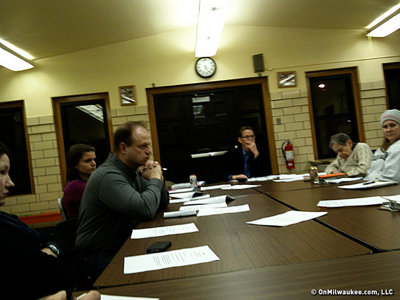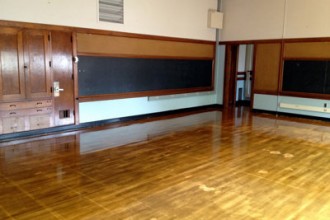The proposed merger of 68th Street School with nearby 81st Street School has been on our radar, as you’ve likely noticed if you follow what I write about Milwaukee schools. The issue is an important one.
For me, it’s interesting, in part because the two schools are not far from where I live. But, of greater city-wide concern, there are similar discussions popping up in other neighborhoods, too – most notably Bay View – where residents are eager to return to the idea of the local school as a neighborhood anchor.
Folks across the city are watching to see how this plays out. Future enrollment in the district may be affected not simply by how it ends, but also by how it is handled by MPS.
As a bit of background, 68th Street School’s building is a small one and its program – which includes a number of K3 students (unfunded by the state) – has had a difficult time keeping up with the budget realities. Threats of closure have been playing like a broken record for many, many years. In the past couple years, that talk has heated up and although the school avoided shutting down last year, it couldn’t escape that reality this year.
It was encouraging at the end of 2011 when MPS Superintendent Gregory Thornton asked the board for more time to try and find a way to keep the school’s successful early childhood program alive in a different location.
Almost immediately, a group of parents and staffers from the school joined forces with neighborhood associations from Lenox Heights (68th Street’s home), Cooper Park (81st Street’s), Enderis Park and Enderis East, to craft a proposal that would merge 68th Street’s program with 81st Street’s K-8 program. Later, Kops Park neighborhood became part of the discussion, too.
For the next few weeks, these folks worked hard to craft a detailed 50-page plan, bringing in the two aldermen who represent the areas and talking to a number of school board directors, too. They sought advice and they tried to build a workable plan. They also attempted to approach 81st Street School and after an initial welcome, they say they were rebuffed by the school’s principal after she’d been told by MPS administration not to speak to them.
Could they have made some missteps? Maybe, but who wouldn’t? They’re not professional politicians or community organizers. They’re residents concerned about their neighborhoods and schools.
Though it’s hard to imagine no one on Vliet Street had heard of this plan, that seemed to be the position the week of the January board meeting at which it was discussed. Folks were saying the district, “just got the plan this morning,” the day before the meeting.
While the proposal was submitted that day, the meat of it ought to have been very well known by then. We wrote numerous articles, Office of Board Governance knew – it had been informed of meetings with school board members – board members knew, the 81st Street School principal knew, two aldermen and their staffs knew, members of four neighborhood associations surrounding the schools had been informed, the area’s regional executive specialist, who reports to the superintendent, certainly knew and was in frequent contact with those putting forth the idea.
The administration has its own proposal and that is to move 68th Street’s program to Kluge, four miles directly north. Kluge likes the idea. Ninety-seven percent of 68th Street families responding to a survey said they would not attend Kluge.
Certainly the district doesn’t have to do exactly what a community group suggests. It can’t be expected to run a roughly 170-school district by consensus. But it does have a duty to work in a respectful, open way with those groups who are seeking to bolster schools and communities. Whether or not that has happened here depends who you ask, of course.
The neighborhood plan is an attempt to preserve a program but also to bring students back into a district that suffers near-constant sagging enrollment; to lure some of the many neighborhood families back to MPS via a great neighborhood school.
The staff at 81st Street School doesn’t want to alter its program to K3-5, which it might have to do in order to accommodate the 68th Street program. It doesn’t want its sixth-eighth graders to have to leave to attend other schools. And they fear that if the plan fails, it could bring down their school. Who can blame them for any of these concerns?
The solution, however, should not be to kill a plan because everyone does not immediately agree. These two schools must get together and have a serious talk about what the future looks like in terms of budgets, in terms of enrollments, in terms of community support and see if they can agree to a workable plan that suits everyone.
MPS should be in the business of facilitating these discussions. To ignore their potential is a lost opportunity. Overall, MPS must sit down and talk with communities across the city. If it wants to know why families left and how to get them back, ask them.
And when four neighborhoods come knocking on your door with an idea that maybe isn’t perfect, saying they want to not only keep families from leaving the district, but to help bring families back? Open the door, pour them a cup of coffee, roll up your sleeves and get down to business.
These are not your enemies. These are not the people to out-maneuver. These are your allies … for now. Hold them tight.


 i evaluate to yes even if there's no image
i evaluate to yes even if there's no image  i evaluate to yes even if there's no image
i evaluate to yes even if there's no image  i evaluate to yes even if there's no image
i evaluate to yes even if there's no image  i evaluate to yes even if there's no image
i evaluate to yes even if there's no image  i evaluate to yes even if there's no image
i evaluate to yes even if there's no image  i evaluate to yes even if there's no image
i evaluate to yes even if there's no image 